A new grading model was introduced to the Academic Senate about a year ago, sparking conversation around MSJC. Earlier in March of this year, the school’s governing bodies decided they would not adopt the plus or minus grading model at MSJC in Fall 2025.
Since Feb. 27, 2024, the Academic Senate has offered weekly support to the Student Government Association (SGA) legislative meetings. It has provided data surrounding the model, giving interesting insight into students’ perceptions of the plus or minus model and existing grade datasets that compare the whole letter model to the plus or minus model. Although the decision has been made for Fall 2025, MSJC has gained a lot of valuable information that students and faculty should check out if discussion about student GPAs and this grading model were to resume.
To provide background on how the conversation started, On Jan. 18, 2023, MSJC Biology professors Nick Reeves and Ryan Henderson came to the Academic Senate to propose a new grading model that would add more finalized course grades, switching the current system from whole letter grading to plus or minus letter grading. Sixteen community colleges in California are using the plus or minus grade model. Reeves and Henderson initially requested to add six more possible grading outcomes, but they shortened to four with time. According to the professors’ proposal and rationale, they “think our current grading convention systemically hurts our students and could place them at an academic disadvantage compared to other students who are competing for acceptance letters.”
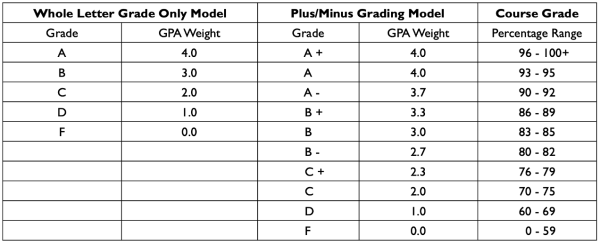
The Academic Senate wanted to collaborate with the professors, which asked for the following: they asked Reeves and Henderson “to take it on the campaign trail” and see how students and faculty would like it, which included the Curriculum Committee, Student Success Committee, and SGA; and to tweak the proposal so that it would only add four new grading outcomes (A-, B+, B-, and C+) which would not fall below failing level. Reeves and Henderson emailed Student Life Director Kevin Baker with no response. Additionally, Henderson had exchanged with Dean Nevins at Santa Barbara City College to ask him about their experiences with getting plus/minus grading approved at their college.
Reeves and Henderson took this further and returned to the Academic Senate on Apr. 5th with a detailed presentation about their findings and reasons for backing the model. They conducted a faculty-wide survey of 115 MSJC faculty, asking for their opinion on the grade change. 72.2% of them supported the proposal, while 27.8% spoke out against it.
In collaboration with the Academic Senate, Henderson and Reeves began gathering data around MSJC to gain more insight into how the implementation will affect the school as a whole. On Feb. 9th, 2023, Reeves and Henderson sent an email requesting all faculty at MSJC to detail their student’s grades in their classes for a study they were creating. They compiled the student data and converted it from the whole letter model to the plus or minus model. These results would update throughout February, and the final result shows the upsides and downsides of 1,937 student GPAs.
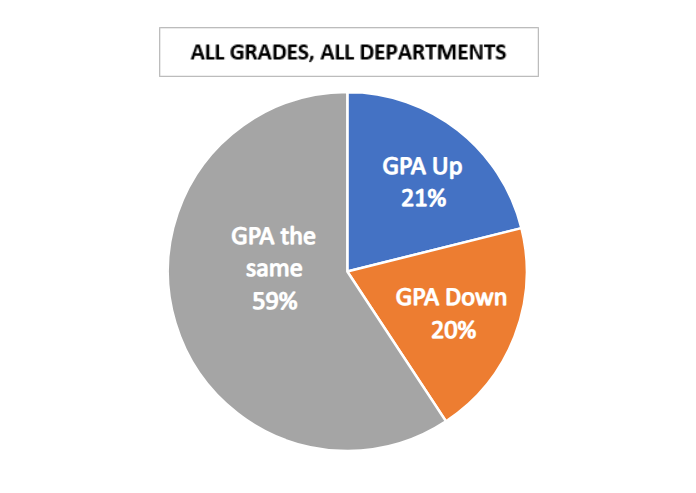
Students from eight different disciplines showed that the model would see a 21% increase in grades and a 20% decrease for some students, with 59% remaining the same. When comparing the departments, those related to Psychology, English, Anatomy, and Biology would see a slight boost in GPA, while Math, Chemistry, Physics, and Communication would experience a slight decrease. However, a common theme is that around 50%-70% of student GPAs would stay the same.
Subsequently, discussions amongst the SGA became involved with the Academic Senate on Feb. 17th, 2023. The SGA intervened in the passage of the new grading policy, believing there needed to be more exposure to this subject. They were adamant about involving the student body in this process, and the organization thought that the new policy would negatively impact students by significantly altering the chances of transfer admissions, financial aid eligibility, scholarship funds, and academic honors.
The SGA worked on a survey asking for students’ thoughts on the grade change. On Nov. 3rd, the SGA sent out the “Plus/Minus Grading Policy Student Feedback Survey” to every student’s email and closed it in two weeks. Over three hundred students answered the survey; however, this is only a small percentage of the student body, considering that MSJC has admitted 25,000 students annually.
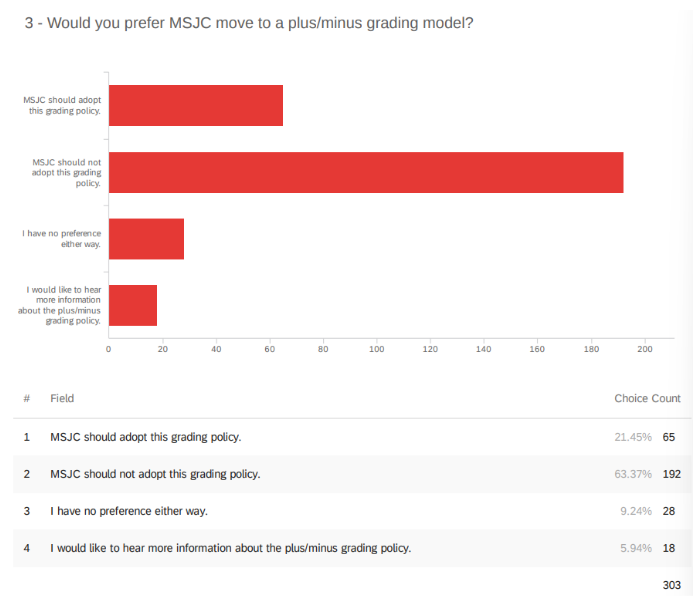
Three hundred three students completed the survey between Nov. 3rd and Nov. 22nd, representing approximately 1.20% of the student body. Most responses were from students who stated they would graduate in “Spring 2024 or later.” The SGA has made the results public, and the response was overwhelming disapproval of the grade change. One hundred ninety-two students said, “MSJC should not adopt this grading policy.” Additionally, students provided their own beliefs, many stating that the new system would negatively affect their GPA. The survey answers provided more points of contention, with many believing the change would worsen their mental health and that they would consider switching schools.
Weeks of legislative meetings leading up to the final decision were full of debates and updates amongst the governing bodies. Henderson and Michelle Vogel-Trautt presented the ever-updating results of the student datasets. The results from both the student survey and student data sets generated pivotal points on both ends, which only grew discussion amongst the SGA and the Academic Senate on whether to cosign or reject the proposal.
On Feb. 27th, after one last prolific discussion, the SGA decided not to cosign the decision by an extremely slight margin (eight to seven). The Academic Senate followed with a vote of 3-2 in favor of the policy change. MSJC Superintendent President Roger W. Schultz and the Board of Trustees decided that for Fall 2025, they would not adopt this grading policy. Dr. Roger Schultz confirmed in an interview with the Talon that he would not adopt this policy unless faculty and students agreed and more time was given to prepare for implementation. However, Dr. Roger Schultz hopes that the conversation will continue.
MSJC may not see the implementation of this proposal in Fall 2025, but Henderson, Reeves, or other faculty could revisit the motion. Henderson and Reeves are adamant about pushing for this new grade model, hoping students will see its benefits. They believe this will give everyone leverage, not just high-achieving students. As a student, staying informed about everything the Academic Senate has laid out for the next time this plus or minus model is proposed again is important.
The Talon will release interview transcripts with Roger R. Schultz and interviews with Reeves and Henderson. Get notified when they are released at the MSJC Talon Instagram.










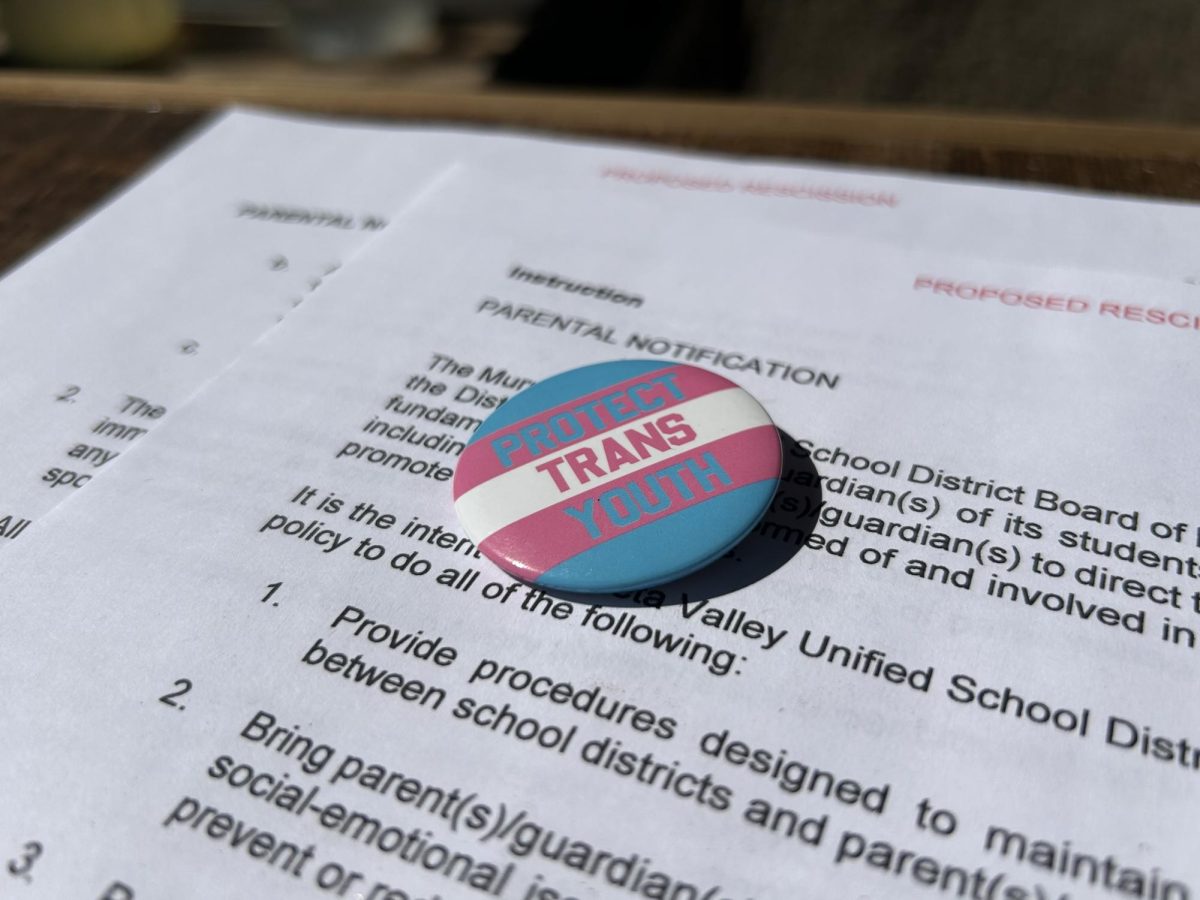





















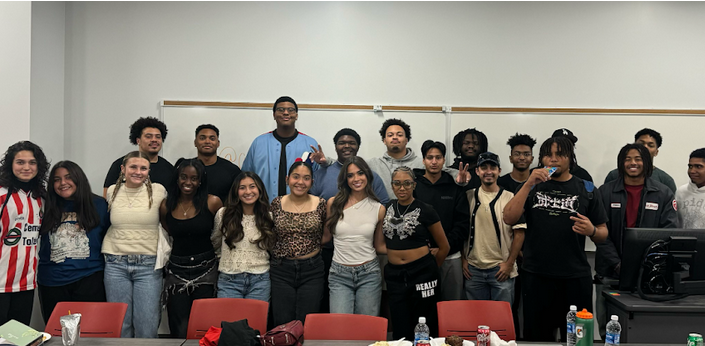


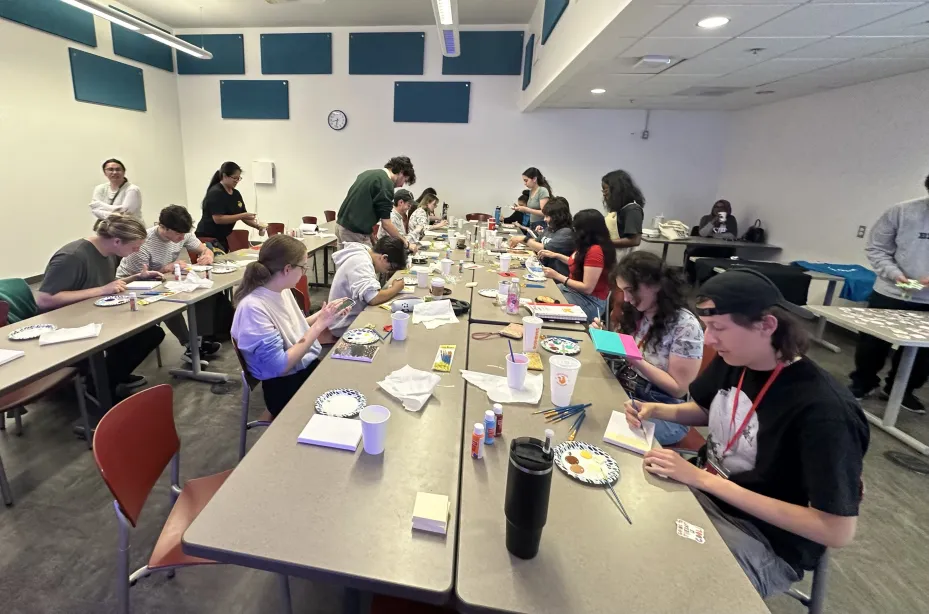


































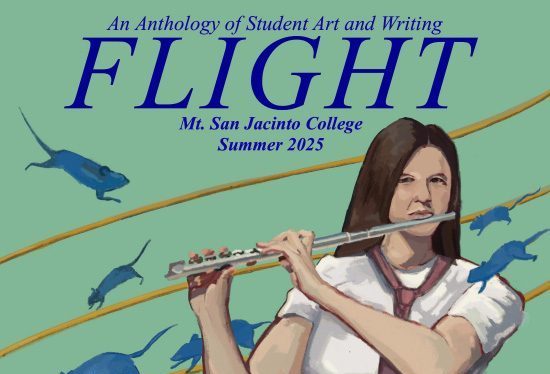































Eli • May 13, 2024 at 2:29 pm
I would have agreed with the idea but I keep getting signed out of my email and so I didn’t see the survey. This sounds like a goo idea though, like it would reward the hard workers and possibly motivate others. A few percentage increase is easier to achieve than a whole ten increase.